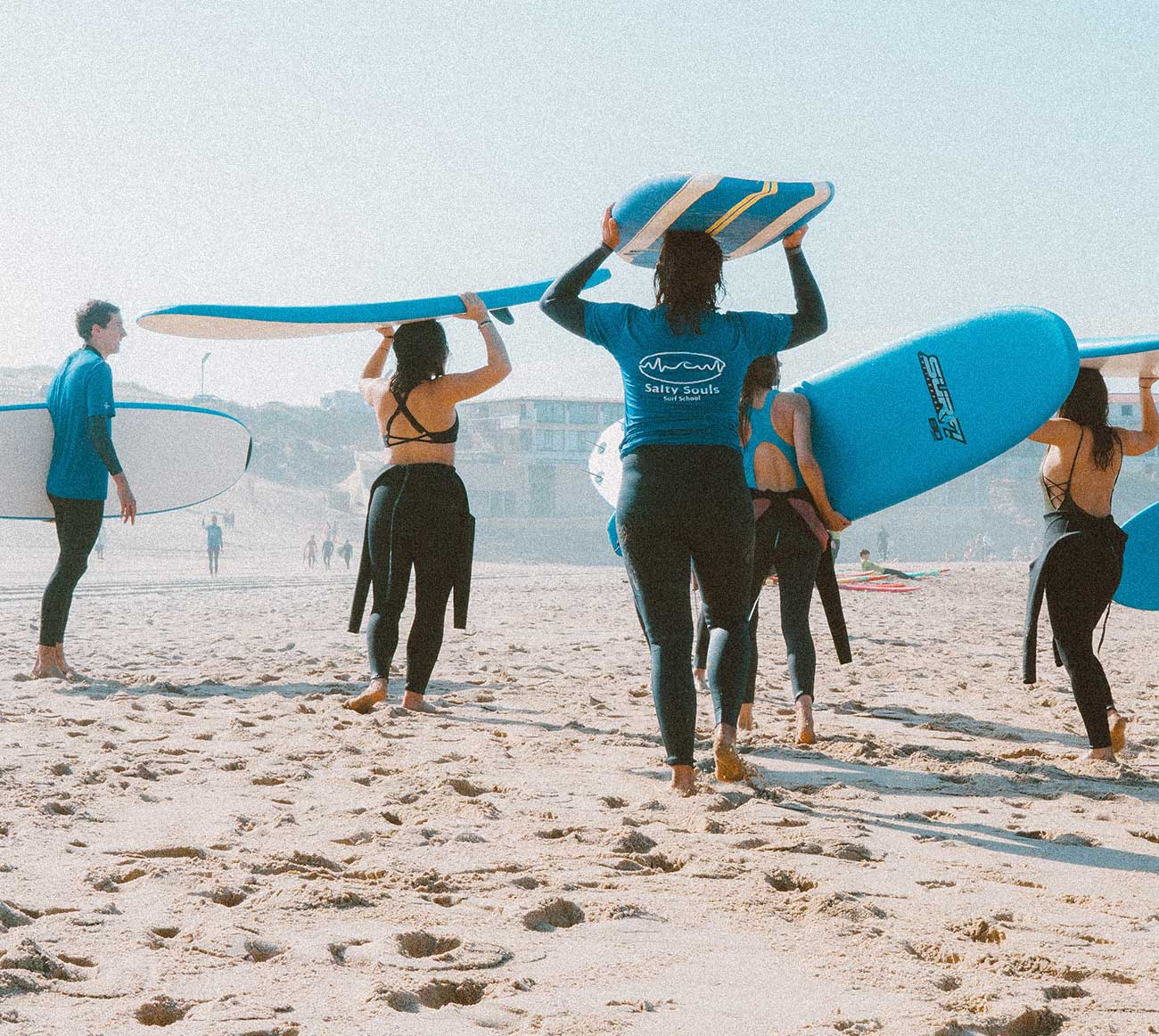
Surfing in Lanzarote – Your Questions Answered
At this point you probably have loads of questions about surfing and your surf lesson and how to progress. Let us help you understand and answer some of the questions you will have as you get prepared to start surfing.
- What sort of board will I be using and can you help me find a board to suit my ability and help me progress in the future?
Let me start with a story… When I first started surfing I bought a 6’2 hard board made from foam and coated with fibreglass and resin, as there was no surf school’s around we just jumped into the water and learnt ourselves to surf. What took us 3 months to learn I can now coach people into on their first day.
When we first start surfing we need a board with plenty of volume, this helps to float you in the water, the volume of the board also helps the wave to push you along with less effort this allows you to get your basic surfing skills up and running quickly. We generally start of on 8 to 9 foot foam boards but this also depends on some factors like:
- Your height
- Your weight
- Your skill level
- Your fitness level
These boards have a foam finish and are often known as foamies, they are the safest boards to use as the volume, width, thickness and length is specifically designed to help you catch waves on a stable platform allowing you to progress quickly. Another big bonus of the foamie, if it hits you it doesn’t hurt as much as a solid epoxy or fibreglass boards.
Once you progress in surfing we will advise you which board you should use depending on:
- How often you’re going to surf
- What kind of waves you are going to be surfing
When you are here surfing with us we will encourage you to try some of the different boards we have in stock, so you get a feel for:
- Size difference
- Weight difference
- Fin set up
- Volume
- Board shape
Best advice, don’t jump into buying a short board that is too small with no volume as this will only slow down your progression and leave you frustrated. Remember the surfer having the most fun is the surfer catching the most waves.
- How long will it take to learn to surf and will I be able to stand up on the first day?
This is one of the most common questions asked when teaching surfing or speaking to someone who would like to try but feels doubtful.
The answer is… it all depends on you.
- What is your goals
- what job do you do
- What kind of sport do you practice already
- How many days are you coming surfing
The more sporty you are the easier it is to adapt to new forms of exercise but that doesn’t mean you are not able to surf or that you’re not flexible.its all about creating realistic goals for your progression and expectations.
The more seated your job is the less flexibility you would generally have in your back and spine, unless of course you keep yourself moving out of work, but this doesn’t mean you can’t make great gains as your surf sessions progress over the days as surf fitness comes from surfing also,
Best advice… enjoy the journey, we all know the focus is to progress and reach our goals but the journey is the fun part too, don’t be too hard on yourself as lots of things have to match up to make the perfect surf session like
- Favourable wind direction and wind strength
- Wave size
- The bottom contours of the area you are surfing
- The wave period
Remember all these factors play a role in the perfect surf experience and surfing is a lifestyle choice and lifelong quest of knowledge.
- Will the waves be big and what size waves do you need to surf?
The size and strength of the waves we surf play a big role in surfing, in our mind we imagine the waves have to be huge barrelling powerful monsters, this stems from the movies and stories of big wave surfers riding giant waves however this is not what we are looking for.
To begin with we want a nice soft slopping beach that generates soft spilling waves. The smaller the wave the better as you learn to handle the board and your mind.
Beginner surf lessons are held in the white water keeping you within your comfort zone and making the process much easier. This is a 1.5ft to 2ft wave and the ability to walk out to a wave and stand knee to waist deep in the water.
Once you progress in surfing and surf fitness and your confidence level rises you may wish to try some of the more powerful waves, however most beaches can only handle so much water before the shape of the wave is compromised and the wave is no longer surfable.
Best advise… be careful what you wish for the small surf days are relaxed and generally the days you catch your best waves, be aware of your fitness and surf ability before you try to move up the level, always start off your advanced sessions with an instructor and if you are surfing in your free time go with a friend, and remember bigger is not always better.
- What is a rip current and is surfing safe?
Like all sports there are risks, but it’s how we manage our choices, decisions and hazards that make the difference.
When you start surfing you need to become a risk manager.
If you are aware of the potential hazards then you can minimize risk to yourself and others.
When you start surfing you need to understand how the Ocean works and how we can fit in to it without the fear and anxiety of being carried away on an ocean current.
From the very first day you should make it your business to know what’s happening on the beach and in the water:
- where is the safety equipment situated
- where is the lifeguard
- where is the surf zone (if it is marked on your beach)
- is the tide coming in or going out
- what is the weather forecast
- what direction is the wind
- what size are the waves.
- Are there any visible rip currents and do i know how to use them.
Most importantly what is your surf experience and surf ability. The easy answer is to make yourself aware of the possible risks at each location by taking a surf lesson hiring or a surf guide to help you understand the break,
Our surf sessions include all the surf safety you need to help you make an educated decision:
- Board handling
- Wave prediction
- Rip current recognition
- How to use a rip current
- Lateral currents and long shore drift
- How to get off your board
- How to fall
Best advice… Local knowledge is priceless, make sure you know before you go and if you are in doubt don’t go out.
All in all surfing is a dynamic, exhilarating sport that uses not only your body but your mind. Knowledge is king as you navigate your journey but beware surfing can really change your life.
You have made the decision to jump in and learn to surf or you are looking to advance your surf skills to the next level.
